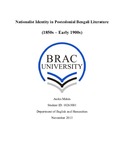Nationalist Identity in Postcolonial Bengali Literature (1850-Early 1900s)
Abstract
Identity is one of the central areas of interest in literature, particularly postcolonial literature.
Postcolonial literature and literary theories deal with the issue of identity, the dimensions of
identity and identity crisis of the postcolonial nations. As such, nationalist identity also occupies
a very substantial part of literary works of postcolonial literature. Postcolonial literature bears
witness to how nationalist identity of any particular region underwent changes and
metamorphosed within the paradigm of colonialism. Postcolonial literature or literature of the
colonial period then is a window into the past. It acts as one of the most significant sources for
understanding the history and the present-day of the postcolonial world.
This thesis looks into the emergence and formation of nationalist identity through
postcolonial Bengali literature. The literary texts I have used as my primary texts extend over a
period of seven decades, that is, 1850s to the early 1900 colonial Bengal. This roughly seven
decades in the history of Bengal is of the most critical importance as this is the period in history
that truly metamorphosed Bengal and the Bengali people into what it is today. This is the period
that oversaw the emergence and formation of the Bengali nationalist identity. In this thesis,
through the literary works of Pyarichand Mitra, Michael Madhusudan Dutt, Bankim Chandra
Chattopadhyay and Rabindranath Tagore I will be sketching a graph of the emergence, formation
and development of nationalist identity in Bengal.
Keywords
English and humanitiesDescription
This thesis is submitted in a partial fulfillment of the requirements for the degree of Masters of Arts in English, 2013.Department
Department of English and Humanities, BRAC UniversityType
ThesisCollections
- Thesis, B.A. (English) [624]

